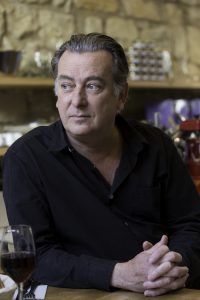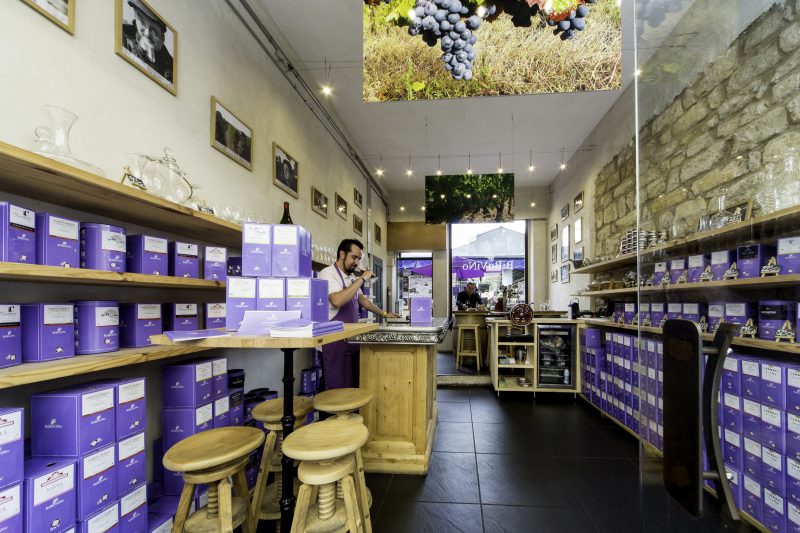Bibovino, “good wine in handsome Bibs”, was founded by Frantz Roesch, Bruno Quénioux and three friends, later joined by Capital & Dirigeants Partenaires.
You launched Bibovino in late 2013, and have made a name in wine distribution. What makes you stand out?
Our distinctive trait is the container we have chosen for our concept, the Bag in Box, or Bib, also known as a “cubi” (for cubitainer) in common parlance. This practice has been used for 40 years, and has garnered 40% of the wine market in the last 15 years. That’s a huge share! In this new and rapidly growing segment of the wine market there was no premium or top-of-the market range, before us.
We looked at the wine market that is changing very fast, moving to this type of container and to quality: the French are drinking less, but better! We merged these two movements and proposed “good wine in handsome Bibs”! This is where we stand out: we sell wine only in Bag in Box containers, but our wines are very good vintages.
The Bag in Box has features that attract both individual consumers and restaurants – what are they?
The first is ease of use. For serving wine by the glass, as is more and more frequent both at home and in restaurants. The packaging is less expensive than a bottle, and that has an impact on cost. It is also more environmentally friendly. The carbon footprint of bottles is simply disastrous. But above all, wine can be kept a long time in the Bag in Box after opening. I’m talking in terms of weeks or even months if temperatures are not extreme, whereas in a bottle the wine will oxidize and deteriorate after 24 hours.
Thanks to this long conservation, in our stores customers can taste and choose the wine they like. We open all our wines for tasting in our stores. We have some 40 references, a small number compared to a traditional wine shop, that may carry several hundred wines, which is quite a lot to offer for tasting. Customers can follow their own tastes, and not the advice of the wine merchant.
Bruno Quénioux, oenologist and associate in our company, has steered us to high-quality wines, elaborated by well-known vintners. It is not always easy to get them to put their nectar into Bibs, because of the image, even if we have created an elegant packaging design. Bruno has a keen talent for finding wine of irreproachable quality, and at the same time is able to persuade vintners to work with us.
The last distinctive feature, although this is now a trend among wine sellers, is that we are both a wine shop and a wine bar. We offer snack-type foods to go along with wine by the glass, as well as carry-out sales. This is a leading trend in the wine merchant business. It’s a good way to take back market share from mass retail distributors.
Capital & Dirigeants Partenaires invested in your company in September 2015. What were the components of this operation?
It was a twin operation to increase equity and to issue convertible bonds, essentially aimed at accelerating development. Our network is expanding fairly rapidly: we have opened some ten shops since we met up with Capital & Dirigeants Partenaires.
This growth generates the need for working capital, notably to finance our stock. The more shops we have the more wine we have to buy, so we must anticipate our purchases and in some instances take an option on wines before the harvest. This was the case in Burgundy this year. We have also invested in an Enterprise Resource Planning tool and a website, but for the most part our cash needs come from the increase in wine stock. We can now develop our network without worry and secure purchases in advance for quality wines.
Beyond the financial injection, what do you want from your investor?
This is why we chose Capital & Dirigeants Partenaires. We met with several investors, some of whom had an exclusively financial profile. What persuaded us to work with this team is that they do not limit themselves to financing and their role as investor. They also propose managerial support and advice, and offer us the benefit of their ecosystem enriched by extensive experience and past and present equity holdings, in the digital economy as well as in traditional sectors. For us this was a decisive factor. The modest structure with senior qualifications and the involvement of Bruno Annequin and Hubert Méraud working alongside us are fundamental aspects.

What are your objectives in the medium term?
First focus: the stores. Today we have 30 franchised shops. We want to move up to 50 fairly quickly. That was our initial objective. It is not enormous on the scale of the wine sellers’ market, but it is a good threshold for an initial market coverage. For the moment we have no competitors who do the same thing as we do, i.e. a product range exclusively in Bibs. We believe that we have to occupy this segment rapidly and develop in France and abroad, continuing to use the franchise model. We are already present in Belgium, and soon in Switzerland.
Second focus: online sales, even if we will never be a pure player, because we also sell our products when we have customers taste them. Online sales are advantageous when customers buy a second time, and once we start to have a reputation. But we have not figured out a way to offer tasting via the internet!
Final focus: restaurant sales, the Café-Hotel-Restaurant sector. We are just starting to target this sector and we think there is a lot of potential. We already offer a broad range of wines by the glass for restaurants, with success. The container is practical, and it avoids the need for wine-cellar type investments to distribute wines via a nitrogen gas circuit. The Bibs are a simple solution that requires practically no investment to offer wine by the glass. Without product loss! That is the real problem for restaurants that offer wine by the glass from bottles. They have to throw out the top-of-the market wine that is left in the bottle…
Your personal itinerary has been rich and varied. What brings you to the wine market today?
I have founded several companies in my life. First in advertising. Then in car rental, with UCar. I have also built photovoltaic solar power plants, that I continue to own. Having created four companies, I wasn’t planning to stop at the age of 60!
The project all started when I met Bruno Quénioux. He is a true wine professional, unlike me; I’m more experienced in franchising and creating businesses in general. We quickly realized the potential that was to be had with the intersection of two long-term trends in a big market, with over 60% of the French population as consumers. As experienced observers, we saw that the market was tilting toward the Bag in Box, with two-figure growth for 15 years, but without offering quality, for the time being. It was obvious that there was room for premium.
With a special marketing focus to surmount the mediocre image of the Bib?
Yes and no. For marketing, I know what to do, I have highly accomplished associates in the field. But the key, once again, is the tasting. There is a negative image attached to Bib, that is associated with supermarket “cubis”, mini jugs. Now are shops are attractive, our packaging is sober and elegant, but what really makes the difference is that people can taste! And they say that the wine is really good! So the image problem is solved by tasting. This is one of the reasons we think that the internet can only be a supplementary channel and not the main outlet.

